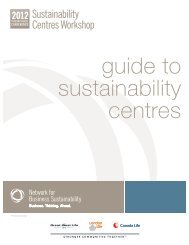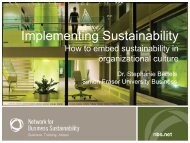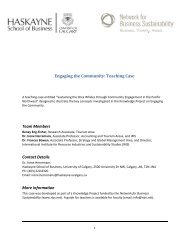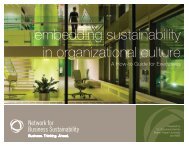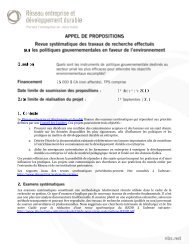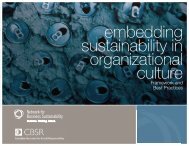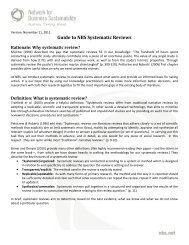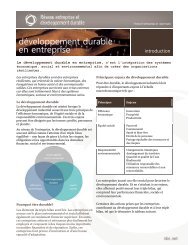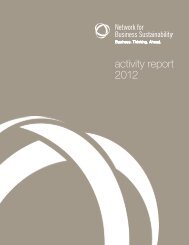Systematic Review - Network for Business Sustainability
Systematic Review - Network for Business Sustainability
Systematic Review - Network for Business Sustainability
Create successful ePaper yourself
Turn your PDF publications into a flip-book with our unique Google optimized e-Paper software.
development on the needs of the poor as well as<br />
building long term relationships with such partners as<br />
local communities, local companies and NGOs, firms<br />
can meet the dual goals of satisfying stakeholders’<br />
expectations <strong>for</strong> growth as well as satisfying social and<br />
environmental stakeholders (Hart and Christensen,<br />
2002). See Appendix 6 <strong>for</strong> further illustrations of frugal<br />
and reverse innovations.<br />
Such disruptive business models at the base of the<br />
pyramid offer important lessons to firms in a developed<br />
economy:<br />
• Build diverse and multiple relationships — from<br />
local support through to government-level policy<br />
dialogue<br />
• Form new alliances – e.g. <strong>for</strong> supply chain<br />
sustainability<br />
• Consider local needs when developing products<br />
and services<br />
• Leverage the strengths, capacity and capabilities<br />
of the local community, either by engaging them<br />
individually, by building on existing networks or by<br />
creating new networks<br />
• Adapt products and processes and redesign<br />
business processes to fit the local context: reinvent<br />
cost structures, reduce costs, rethink<br />
functionality from product service systems, utilize<br />
renewable or human-made resources instead of<br />
non-renewable resources, draw inspiration from<br />
nature (biomimicry), rethink delivery and distribution<br />
methods<br />
• Adopt a stakeholder rather than shareholder view<br />
of the firm: understand that the organization’s<br />
success is inextricably linked to the success of its<br />
stakeholders<br />
For Organizational Trans<strong>for</strong>mers operating in<br />
underserved markets, the required innovation strategy<br />
is not to fine-tune systems, optimize existing processes<br />
or ship end-of-line or discontinued products to<br />
emerging markets, but to place the TBL at the centre of<br />
the business model. Multinational corporations (MNCs)<br />
can learn both from the innovative business models<br />
emerging domestically in these countries and from their<br />
own ventures in these markets in which the principles<br />
of the sustainable business model, so much as they are<br />
currently understood, can be piloted in separate (“ringfenced”)<br />
initiatives, e.g. in departmental, product-level<br />
or SBU-level experimentation.<br />
In Practice<br />
Cisco, a global networking technology<br />
company, invested in Aavishkaar, a venture<br />
fund founded to promote development<br />
in rural and semi-urban India. Cisco aims<br />
to promote technology-enabled inclusive<br />
growth and seeks to use this investment as<br />
a way to both learn about the market and<br />
accordingly align technology innovation.<br />
Adapted from UN Global Compact &<br />
Rockefeller Foundation (2012).<br />
Local firms can use innovative approaches when<br />
delivering products and services to the underserved.<br />
MNCs can learn lessons from these experiences<br />
(Prahalad & Hart, 2002) through “learning investments”<br />
(UN Global Compact & Rockefeller Foundation,<br />
2012): strong anecdotal evidence supports pro-poor<br />
innovation — both <strong>for</strong> those living in poverty and by<br />
those living in poverty — as a stimulant <strong>for</strong> creating<br />
new business models. Many cases of social innovation<br />
in new or niche markets start outside the mainstream,<br />
Innovating <strong>for</strong> <strong>Sustainability</strong> 53



